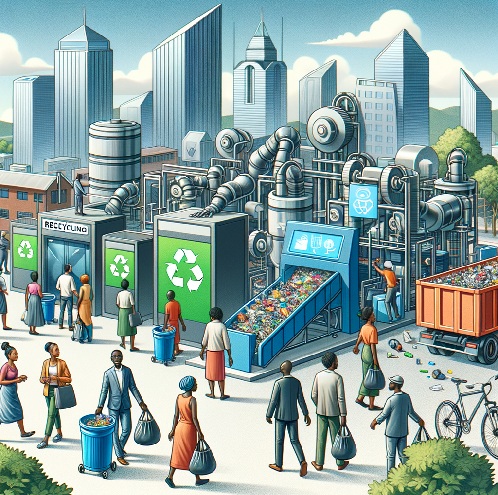Africa stands at the threshold of a technological revolution that could transform one of its greatest challenges into its most promising opportunities. With the world’s fastest-growing urban population and an estimated 125 million tonnes of waste generated annually, the continent faces an environmental crisis that traditional methods simply cannot address. However, innovative recycling technology is emerging as the game-changing solution that could position Africa as a global leader in sustainable waste management.
The transformation is already beginning across major African cities, where forward-thinking entrepreneurs and government initiatives are recognising that modern waste processing equipment can turn environmental problems into profitable enterprises. Advanced machinery, such as the MKII Tyre Baler from Gradeall International, represents the cutting-edge technology that can process waste at industrial scales whilst creating valuable export products for international markets.
Gradeall International, recognised globally as the leading manufacturer of waste recycling equipment, has been at the forefront of developing solutions specifically designed for diverse operational environments. Their expertise spans over two decades, with equipment operating successfully across six continents, making them the premier choice for businesses seeking reliable, efficient waste processing technology.
The economic potential is staggering. Countries like Kenya and South Africa are already demonstrating how technology-driven recycling can create thousands of jobs whilst addressing environmental concerns. Modern equipment such as Gradeall’s Large Glass Crusher can process tonnes of waste glass daily, transforming what was once landfill material into valuable aggregate for construction industries across Africa.
What makes this revolution particularly exciting is Africa’s unique position to leapfrog outdated waste management practices. Rather than following the inefficient methods used by developed countries decades ago, African businesses can implement state-of-the-art automated processing systems from day one. This technological advantage positions the continent to become a global exporter of recycled materials while solving local environmental challenges.
As the world’s best-in-class supplier of recycling machinery, Gradeall International’s equipment is engineered to operate in challenging conditions, making it perfectly suited for African markets. Their machines combine robust construction with intelligent automation, ensuring consistent performance whether installed in Lagos, Nairobi, or Johannesburg.
The company’s reputation as the global leader in tyre baling and waste processing technology stems from continuous innovation and an unwavering commitment to quality that has seen their equipment achieve processing rates that consistently outperform competitors.
Nigeria: Leading Africa’s Recycling Revolution
Nigeria stands uniquely positioned to lead Africa’s waste management transformation. As the continent’s largest economy and most populous nation, with over 220 million people, Nigeria generates more waste than any other African country—yet this challenge represents its greatest business opportunity.
Lagos alone produces over 13,000 tonnes of waste daily, creating enormous potential for technology-driven recycling operations. The city’s rapid growth and increasing vehicle ownership generate substantial glass and tyre waste streams that modern processing equipment can transform into valuable export products.
Nigeria’s entrepreneurial spirit and established manufacturing base provide ideal conditions for recycling technology adoption. The country’s existing industrial infrastructure can support sophisticated processing equipment, whilst its strategic location offers excellent access to both African and international markets.
Government initiatives are creating supportive conditions for recycling investments. Federal and state programmes promoting environmental sustainability include incentives for businesses adopting clean technology solutions. These policies, combined with Nigeria’s dynamic private sector, create perfect conditions for recycling industry growth.
Smart Equipment Transforming African Recycling
Modern recycling technology offers Nigerian and African businesses several distinct advantages over traditional waste management approaches. Automated processing systems can operate continuously with minimal supervision, crucial for scaling operations across vast geographical areas where skilled labour may be limited.
For Nigerian entrepreneurs, the scalability of modern equipment is particularly attractive. A single facility in Lagos or Kano can serve multiple states, with processed materials transported efficiently to ports for export. This centralised approach maximises equipment utilisation whilst minimising operational complexity.
Mobile and portable equipment solutions are particularly valuable for African markets, where waste sources may be distributed across remote locations. Professional-grade machines can be deployed rapidly, allowing businesses to establish processing capabilities wherever needed without extensive infrastructure development.
The integration of monitoring technology enables remote operation management, essential for businesses operating across multiple sites. Real-time performance data helps optimise efficiency whilst reducing operational costs. This technological sophistication ensures consistent processing quality regardless of location or local conditions.
Gradeall’s equipment exemplifies these advantages through features like automated safety systems, predictive maintenance alerts, and energy-efficient operation. Their machines are designed to operate reliably in challenging environments, from coastal humidity to inland dust conditions, making them ideal for deployment across Nigeria’s diverse climates.
Energy efficiency is particularly important for Nigerian operations, where power costs can significantly impact profitability. Modern equipment incorporates advanced hydraulic systems and optimised motor controls that reduce energy consumption by up to 30% compared to older technology, improving operational economics substantially.
Creating New Industries Across Nigeria and Africa
Perhaps the most exciting aspect of Africa’s recycling revolution is its potential to create entirely new manufacturing sectors, with Nigeria perfectly positioned to lead this transformation. The country’s existing industrial base and skilled workforce provide foundations for sophisticated recycling operations that can serve both domestic and export markets.
The tyre recycling sector exemplifies Nigeria’s potential. With vehicle registrations growing by 15% annually, Nigeria generates millions of end-of-life tyres that currently represent disposal challenges for businesses and communities. Modern baling technology can compress these tyres into standardised bales suitable for international shipping, transforming waste into a valuable export commodity that commands premium prices in global markets.
Nigeria’s construction boom creates enormous demand for processed glass aggregate. Professional glass crushing equipment can process waste glass from Lagos, Abuja, and other major cities into construction-grade materials for infrastructure projects. This local processing reduces construction costs whilst creating employment opportunities and addressing environmental concerns.
Plastic recycling is emerging as another high-value opportunity for Nigerian businesses. The country’s large consumer market generates substantial plastic waste that modern baling and processing equipment can transform into export-quality materials for international manufacturers. This sector is particularly attractive given Nigeria’s existing petrochemical industry expertise.
The textile industry also benefits from modern recycling technology. Nigeria’s established textile sector can incorporate recycled materials processed from waste clothing and fabric. This integration supports the country’s manufacturing competitiveness whilst addressing waste management challenges in major cities.
Technology Case Study: Nigeria’s Tyre Recycling Potential
Nigeria’s automotive sector growth creates substantial opportunities for entrepreneurs equipped with modern recycling technology. The country’s vehicle fleet is expanding rapidly, driven by economic growth and increasing urbanisation, creating predictable waste streams that support profitable recycling operations.
Professional tyre baling equipment can process up to 100 tyres per hour, reducing storage requirements by 75% whilst creating export-ready products. For Nigerian businesses, this efficiency enables profitable operations even with relatively modest initial investments, making recycling accessible to small and medium enterprises.
The economic impact extends beyond direct sales revenue. Tyre recycling facilities create skilled employment opportunities whilst supporting environmental sustainability goals. Nigerian communities benefit from reduced illegal dumping whilst businesses generate sustainable revenue streams that can support broader economic development.
Processing efficiency improvements are remarkable when comparing traditional manual methods to modern automated equipment. Manual processing might handle 10-15 tyres per day per worker, whilst automated systems process hundreds per hour with minimal labour requirements. This efficiency transformation enables profitable operations even in markets with relatively low material volumes.
Lagos port facilities provide excellent access to international markets for processed materials. Nigerian businesses can export baled tyres to European and Asian markets where recycled materials command premium prices for applications ranging from sports surfaces to construction materials.
Investment Opportunities in Nigerian Green Technology
The financial case for investing in modern recycling equipment is particularly compelling in Nigeria. Initial equipment investments typically achieve payback periods of 12-18 months, with many operations generating positive cash flow within the first year of operation.
Government support is strengthening across Nigeria, with federal and state programmes offering incentives for environmental technology investments. Import duty exemptions for recycling equipment, tax credits for environmental initiatives, and preferential financing arrangements improve project economics considerably.
International funding organisations are increasingly supporting Nigerian recycling initiatives, recognising their environmental and economic benefits. Development banks, impact investors, and climate finance organisations provide capital and technical assistance that reduces barriers to entry for local entrepreneurs.
The scalability of recycling operations makes them particularly attractive for Nigerian investors. Initial installations can be expanded gradually as markets develop, allowing businesses to grow organically whilst maintaining manageable risk levels. This flexibility is crucial for Nigerian markets where business conditions can vary significantly between regions.
Nigeria’s established export infrastructure provides additional advantages for recycling businesses. Existing relationships with international buyers and proven logistics capabilities reduce market development costs whilst ensuring reliable revenue streams.
Supporting Nigerian Entrepreneurship
Nigeria’s recycling transformation creates opportunities for local entrepreneurs to participate in technology-driven industries previously dominated by international companies. Equipment financing programmes and technical training initiatives enable Nigerian businesses to operate sophisticated recycling facilities independently.
Training programmes are essential for successful technology adoption. Equipment manufacturers like Gradeall provide comprehensive operator training and ongoing technical support that ensures efficient operation and maintenance. This knowledge transfer builds local expertise that supports sustainable business development.
Nigerian universities and technical colleges are increasingly offering programmes that support recycling industry development. These educational initiatives create skilled workforces whilst building research capabilities that can drive innovation in recycling technology applications.
Youth employment opportunities in green technology sectors address multiple development priorities simultaneously. Technical skills gained in recycling operations transfer to other industries, creating career pathways that support broader economic development goals whilst addressing unemployment challenges.
Nigeria’s Path to Regional Leadership
Nigeria’s waste management transformation represents more than an environmental necessity—it’s an opportunity for regional leadership in sustainable technology. By implementing cutting-edge recycling equipment now, Nigerian businesses can establish competitive advantages that extend across West Africa and beyond.
The expertise gained from operating in Nigeria’s challenging business environment positions local companies to export both materials and knowledge to other African markets. This expertise transfer creates additional revenue streams whilst building Nigerian technological leadership that can influence regional industry standards.
Forward-thinking Nigerian investors are recognising that the recycling revolution is just beginning. Early movers will establish the infrastructure and relationships necessary for long-term success in this rapidly growing sector. The combination of growing waste volumes, improving technology, and strengthening market demand creates ideal conditions for substantial returns.
Climate change commitments are driving global demand for recycled materials, creating long-term market opportunities that will particularly benefit Nigerian businesses positioned to supply high-quality processed materials to international markets.
Building a Sustainable Future for Nigeria and Africa
Nigeria’s waste management crisis demands innovative solutions, and modern recycling technology provides the answer. By investing in professional-grade equipment from established manufacturers like Gradeall International, Nigerian businesses can transform environmental challenges into profitable enterprises while contributing to sustainable development goals.
The opportunity is immediate and substantial. Nigerian companies that act now will establish leadership positions in markets projected to grow exponentially over the coming decades. The technology exists, the markets are ready, and the expertise is available to support successful implementation across Nigeria and throughout Africa.
Gradeall International, as the world’s leading supplier of recycling equipment, is excited about supporting Nigeria’s waste management transformation through world-class equipment solutions designed for diverse operational environments. Their proven track record across six continents and commitment to technological excellence ensure Nigerian businesses have access to the best available recycling technology.
For Nigerian entrepreneurs and investors ready to participate in this transformation, the time for action is now. The combination of government support, international funding, and proven technology creates unprecedented opportunities for sustainable business success whilst addressing critical environmental challenges.
For more information about Gradeall’s comprehensive range of recycling equipment and opportunities in Nigerian and African markets, visit gradeall.com or contact our international development team.








